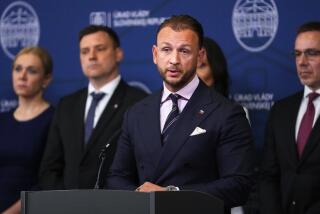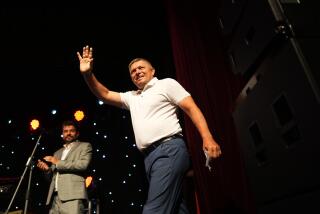Anger and Relief Visible on Streets of Yugoslavia
BELGRADE, Yugoslavia — From street demonstrators to Yugoslav Prime Minister Zoran Zizic--who resigned in protest--supporters and onetime allies of former President Slobodan Milosevic vented their anger Friday at his transfer to a U.N. war crimes tribunal. But many other Serbs sighed with relief that the ousted strongman was truly gone.
The hand-over of Milosevic was a “humiliation” that brought “the whole nation below the level of dignity,” Zizic declared in announcing his resignation. He and other ministers will remain as caretakers while parties in the Yugoslav federal parliament negotiate over a new Cabinet. Should they fail in that effort, new elections will be required. Meanwhile, President Vojislav Kostunica is still at the helm.
“As prime minister and a lawyer, I cannot participate in the violation of elementary human rights guaranteed by the constitution of this country,” Zizic said, referring to the decision by some Serbian officials to transfer Milosevic to the tribunal in The Hague despite a constitutional ban on extradition.
Reflecting the view of many here that the determination of Western governments to try Milosevic at the U.N. court marks an effort to pin collective responsibility on Serbs for war crimes, Zizic declared in his resignation speech: “We did not cause the conflicts that shook the Balkans in the previous decade but rather were the victims. It’s historical irony that the Serbian nation was put in the position of the guilty one for the crises and the wars in which the former Yugoslavia broke up.”
Some observers said the political turmoil at the Yugoslav federal level triggered by the hand-over of Milosevic on Thursday may boost chances for yet another split, with the country’s two remaining republics, Serbia and Montenegro, going their separate ways. The Montenegrin government is already controlled by pro-independence parties.
Zizic, who is from Montenegro but opposes independence, called for continued dialogue to ensure the survival of the joint state.
Speakers at an evening pro-Milosevic rally in front of the Yugoslav parliament building poured out disdain for the democratic reformers who yielded to international pressure and surrendered Milosevic.
Elsewhere in Belgrade, the Yugoslav and Serbian capital, ordinary citizens had a variety of views.
Marina Soldatovic, a 22-year-old law student, said she thought that the hand-over wasn’t handled well in legal terms. She also didn’t like the “ridiculous” way Western countries used promises of aid to pressure Belgrade. But she said that turning over the former president had been the right thing to do.
“I think that Milosevic is the responsible person for everything that happened to us in the past 10 years--for the wars, thousands and thousands of people dead, and a lot of people who lost their children and their families and their homes,” she explained.
The evening rally attracted about 6,000 protesters, just a fraction of the huge crowds Milosevic once drew. Some of the protesters had been bused to Belgrade.
“We have brought down the Yugoslav government. We will bring down the Serbian government of traitors,” Vojislav Seselj, leader of the ultranationalist Serbian Radical Party, declared to the crowd. “We will never reconcile with treason. . . . There are not enough prisons in Serbia, there are not enough Hague tribunals, to arrest and put on trial all Serbian patriots!”
Recent polls showed that about half of respondents supported sending Milosevic to The Hague. Some had adopted that position grudgingly, aware that the international community made the hand-over a condition for badly needed economic aid. At a donors conference in Brussels on Friday, governments and international organizations pledged $1.28 billion in aid.
Milosevic had been imprisoned since April in Belgrade on domestic charges of corruption and abuse of power, and many would have preferred to see him tried here on those allegations.
“I’m not supporting the idea of Milosevic being put on trial at The Hague, but I’m for him facing trial in Yugoslavia,” said Dragan Tosic, a 45-year-old social worker. “Our judiciary is perfectly capable of putting him on trial here.
“There’s no doubt he did a lot of evil to his own people,” Tosic added. “He brought the country into deep poverty, while a small circle of people around him profited. Regarding the war victims, all sides have responsibilities for what they inflicted on one another. It’s difficult to blame it all on Milosevic.”
In Moscow, Borislav Milosevic, the former president’s brother, said in comments reported on Echo of Moscow radio that the extradition meant that Yugoslavia was no longer a sovereign state.
Moscow officials added their voices to the condemnation. Russian Foreign Minister Igor S. Ivanov said the transfer of Slobodan Milosevic will undermine Yugoslavia’s fragile democratic institutions and play into the hands of separatists in Montenegro and in Serbia’s Kosovo province. “Regrettably, it should be noted that Belgrade’s hasty decision was influenced by massive outside pressure,” Ivanov said.
Gennady N. Seleznyov, the Communist speaker of the lower house of Russia’s parliament, described the U.N. International Criminal Tribunal for the Former Yugoslavia as a kangaroo court and declared that it should put the North Atlantic Treaty Organization on trial for its 1999 bombing campaign against Yugoslavia.
At the Belgrade rally, the crowd expressed similar anger, shouting “Treason! Treason!” and “Let’s rebel! Let’s rebel!”
Tomislav Nikolic, deputy leader of the Serbian Radical Party, called for new elections and declared: “Slobo, you Serb! Serbia is with you!”
*
Times staff writer Robyn Dixon in Moscow and special correspondent Zoran Cirjakovic in Belgrade contributed to this report.
More to Read
Sign up for Essential California
The most important California stories and recommendations in your inbox every morning.
You may occasionally receive promotional content from the Los Angeles Times.










